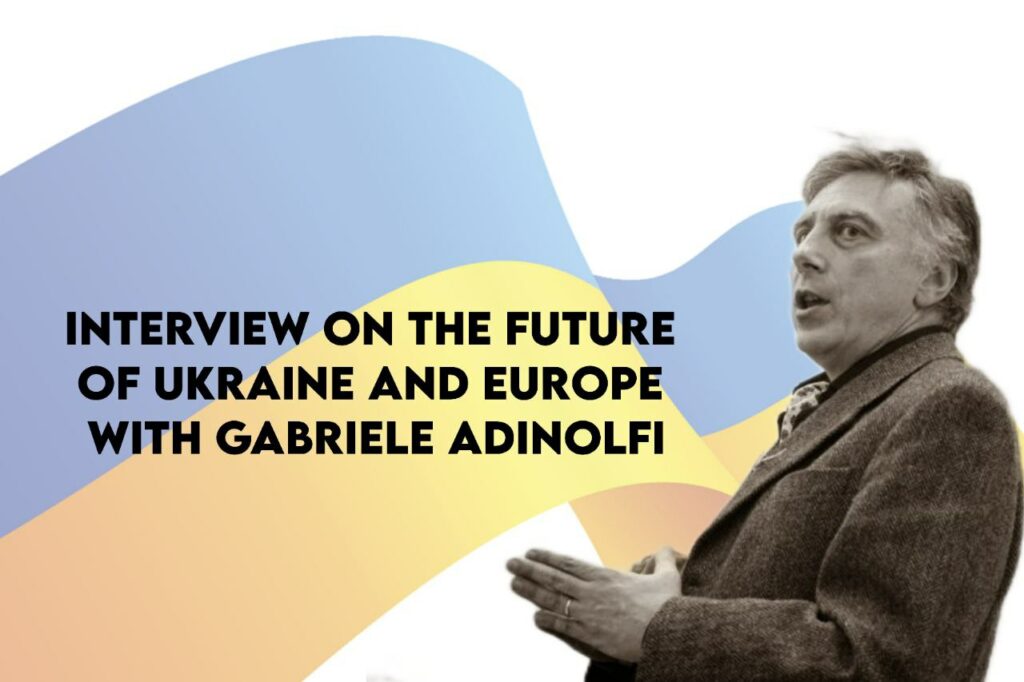Interview on the future of Ukraine and Europe with Gabriele Adinolfi

We have the pleasure of interviewing Gabriel Adinolfi, one of the fathers of Tercerism and a veteran of the legendary Years of Lead. Let’s start with a basic question, how should a European Tercerist respond to the Russian invasion of Ukraine?
In a very clear way. We must support a people that is fighting for its independence and for its own historical and legal identity that Moscow imperialism wants to erase
What is the war in Ukraine for Europe? What is the geopolitical dimension of the Russian invasion of Ukraine?
Russia has chosen to take sides against Europe. Not only in Ukraine where she has moved under false pretexts and pretending to be attacked when Russia is actually the aggressor but also in Libya and Mali. In changing the world balance, Russia wants to slow down European growth and use the only capacity she has, that is the muscles, to stay in the game between the United States and China which, unlike Russia, are true global powers.
Russia by paralyzing the European process in Ukraine raises the tension, favors the increase in gas and oil prices, thus making the American shale affordable but does more: it appropriates the cobalt in the Donbass to curb the innovative European automotive industry, which is even stronger than the American. In addition, with the corn weapon, she starves Africa and prepares mass invasions of Europe from the south. Through Mali Russia broke the Sahel dam and humanitarianly threatens the whole Mediterranean from Libya.
Whoever pushed Putin to the invasion, however, it should be remembered that this favors American interests in Europe and Africa and that we are not witnessing a clash between the US and Russia but between Russia and a European people who are not good for either. the other, but not so bad for the White House
What will be the future of Ukraine? Can Ukraine, as a country that has experienced strenuous heroic efforts against Russian imperialism in recent years, be a laboratory for new European ideas?
The future of Ukraine is very uncertain. The scam referendum in the occupied regions and the threat of defending them with nuclear weapons threatens to produce at the same time a division of the territory and a long war of position that will cost a lot to all Europeans. The people’s war that the Ukrainians are fighting against the invader can indeed set an example for the European renaissance.
We observe today in Europe two types of reaction to the war in Ukraine, the countries of Central and Eastern Europe or Scandinavia, a radical and courageous one, related to the awareness of the direct Russian threat, as well as the reaction of part of the countries of Western Europe headed by Germany and the Benelux countries, minimal and as if not wanted by their authorities. How can a common European response to Russian aggression be developed?
Unfortunately, years and years of materialistic life divide men and peoples according to their interests. The peoples who have undergone Russian domination and those who know them closely, rightly, are indignant and worried. Those further away worry about their well-being and the cost of gas. Gas which, moreover, has not only increased due to the war or the sanctions but had begun to do so earlier and on which the speculators who play on futures in Amsterdam have a decisive role.
Many European countries are heavily dependent on Russian energy resources. Countries such as Germany and the Netherlands are practically fully dependent on them. What should be done to make Europe energy independent of the will of Putin and his oligarchic regime?
First of all, Russia is more dependent on Europe, since its economy is based on this and they have never built anything efficient. The largest nation in the world has the same GDP as Spain! Furthermore, the dependence on Russian gas is less than what is commonly believed.
Moreover, Europe was planning its own energy independence, which cannot fail to pass through nuclear power. It was probably the prospect of that independence, on the agenda since 2020, that pushed Putin to attack.
Nationalists and populists in various countries in Europe present different views towards the war in Ukraine. What do we need to do in order for the unity of European identitarian movements against Russian imperialism to emerge and a continental geopolitical consciousness to be born? Is this even possible?
Unfortunately, the movements live in a materialistic world, especially in the West. In the society of the show many act but they don’t have a soul.
Many movements are composed by marginalized and frustrated people who take a stand only out of opposition. Anything that is condemned by their government is good for them. Then they have an Oedipus complex towards the West. For these reasons, some see Putin’s regime as a paranoid model and not what it really is: a mafia regime in which oligarchy and communism are married. It is an unforgivable pathology that pushes them to close their eyes to reality in order to chase a sick dream. They pretend to be convinced anti-Americans but they reason and behave exactly like the sickest individuals of American marginalization. They are not forgivable but one should not even give them credit: yes, they are dangerous people, but only for themselves
The war in Ukraine and the subsequent conflicts erupting around the world show that the belief of the European public in eternal peace, almost taken out of Kant’s writings, is a fiction. What should Europe’s defense systems, both as a whole and for individual nations, look like?
Europe needs a strong army with a common command, but that cannot be achieved as long as there are individual capitalist interests in individual nations. This is why we must act for a cultural revolution, for a more participatory Europe that can reach a common will, based on the right hierarchy of values. The road is long but the popular defense war in Ukraine could be the beginning of a turning point
Despite the fact that the war on the Ukraine is about the old continent, however, we are seeing the global rivalry moving to the Indo-Pacific. How can Europe take part in this rivalry as a subject, not an object of foreign powers?
The strategic center of the world today is the Indo-Pacific. The war in Ukraine involving Europe risks reducing the game in the Pacific to only two major players: the US and China. The EU remains the world’s leading trading power and has a great diplomatic capacity. The Russian attack also serves this purpose: to create excessive tension in the Indo-Pacific that is not convenient for anyone. Least of all to China, which if it pretends to support Russia is opposing it not a little because her imperialist war can serve American interests but certainly not the Chinese.
France and Germany in recent years had played a very valuable diplomatic and economic role in preventing escalation. The Russian attack weakens the European role there too
How should modern Europeans view the Russians? Are they our lost brothers, but do they no longer definitively belong to Europe?
We can distinguish between the regime and the people, but we cannot forget history either, a history that repeats itself: the Russians always attack Europe and have an inferiority complex towards us, a lot of resentment and a lot of envy. Once freed from the mafia, oligarchic and Soviet regime of today, will they be able to change? We hope so but we will have to test them before.
We often discuss visions of Putin’s overthrow or the rise to power in Russia of a pro-Western opposition. Is such a thing even possible? If there were some form of power shift in the Russian Federation, how should Europe respond?
Putin and his gang tell lies in propaganda. As its former pro-European advisers (Ivanov, Kortunov) write, Russia has no alternative model to oppose the West but fights because it has realized that it has lost the comparison with any other player, including Turkey.
All the accusations that Russia makes against Europe and the USA (lgbt, drugs, rented wombs, materialism) come from the wrong pulpit because Russia is worse off on all these elements than those who criticize and moreover it has almost none of the European qualities. Moreover, they speak of such virtuous men who enrich themselves on Russian resources and send billions to tax havens or to the West and, as Putin does, declare to their tax authorities the earnings of modest bourgeois.
This said, I don’t know if the opposition in Russia is pro West, but it sure is reasonable.
Europe must respond firmly: physical, moral, economic, political and spiritual.
Since the Russian aggression against Ukraine and the inevitable defeats of the Russian Federation in many areas that are considered a natural sphere of influence, movements towards separation from Russia can be observed. Could the weakening of Russian influence in countries such as Kazakhstan and Armenia and the collapse of the authority of the Russian defense alliance spell the end of Russian hegemony in the post-Soviet territories?
This I cannot say. Russia’s holding or implosion are two equally probable hypotheses. But the implosion is actually dangerous because criminals who possess nuclear weapons would not hesitate to use them to save themselves. One must hope for an intermediate scenario between these two.
According to the tradition of our portal, the last words belong to our interviewee. With what message would you like to leave our readers?
To continue to fight for the pride of Poland and Europe and to make motto Slava Ukraini our own!
Thank you for the interwiev
The interview was conducted by Gabriel Malczewski
Graphic design: Resistance Arts


